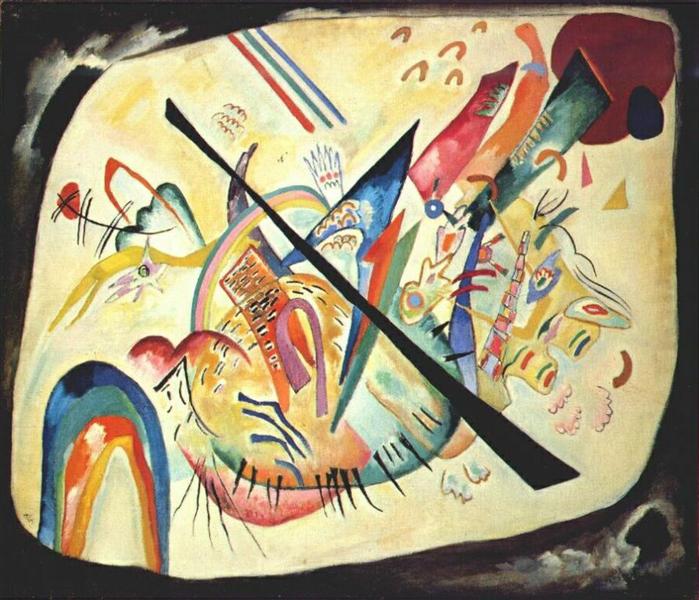Description
The "White Oval" painting of 1919, created by Wassily Kandinsky, is a work that encapsulates the aesthetic and conceptual innovations that the Russian artist explored throughout his career. This work is registered within the context of abstract expressionism, a movement that Kandinsky not only helped define, but also led to its maximum expression. In "White Oval", the oval shape is erected as the focal point of a dynamic composition where the color and shape are articulated in a visual dialogue that invites contemplation.
The composition of the work is essentially abstract, characterized by a fund of warm tones that transition from orange to yellow, creating a luminous atmosphere. This background highlights the central white oval, which seems to float and attract the viewer's gaze. Kandinsky often explored the relationships between color and emotion, and in this work this interaction can be perceived in a palpable way. The use of white not only acts as an empty space, but also represents possibility and potential, a symbol of the beginning of the new after the tumults of the First World War, reflecting its historical context.
The elements within the paint are organized so that visual energy feels in motion and intensifies as vibrant colors interact with each other. The color strokes surrounding the oval are more than simple decorations; They are dynamic that suggest an impulse, an energy dance that captures the essence of the human spirit and its search for meaning in uncertain times. Without characters in a conventional narrative, the work becomes a sensory experience in which the viewer is called to experience the depth of his own feelings and associations with shape and color.
Kandinsky, who was also theoretical of art, addressed the concept of "abstract art" as a pure, stripped form of distractions of the natural world. In his essay "of the spiritual in art", he argues that art must exist as an intuitive form of communication that transcends the tangible. "Oval White" is a testimony of this philosophy, representing a dialogue between the internal and the external, a journey to the essence of the human being that invites reflection on the viewer's own experience.
In addition, the use of geometric shapes in "White Oval" points out a greater inclination towards space structuring, something that would be explored more thoroughly by Kandinsky in his subsequent works. Contemporary authors of the same era or later movements such as the Neoplasticism of Piet Mondrian also worked with shapes and colors in their work, although with a more rigid and mathematical approach. Kandinsky, on the other hand, opted for a more fluid expressionism, where the shape and color become living entities that interact and dialogue with each other.
However, "white oval" is more than a simple artistic representation; It is a reflection of the complexity of life itself, an emblem of the search for beauty beyond the visible and an invitation to enter an area where emotions and sensory perception are intertwined in a visual symphony. The work is not only a central piece in the evolution of abstract art, but also acts as a bridge towards the new possibilities that art could explore in the twentieth century and beyond.
KUADROS ©, a famous paint on your wall.
Hand-made oil painting reproductions, with the quality of professional artists and the distinctive seal of KUADROS ©.
Art reproduction service with satisfaction guarantee. If you are not completely satisfied with the replica of your painting, we refund your money 100%.

